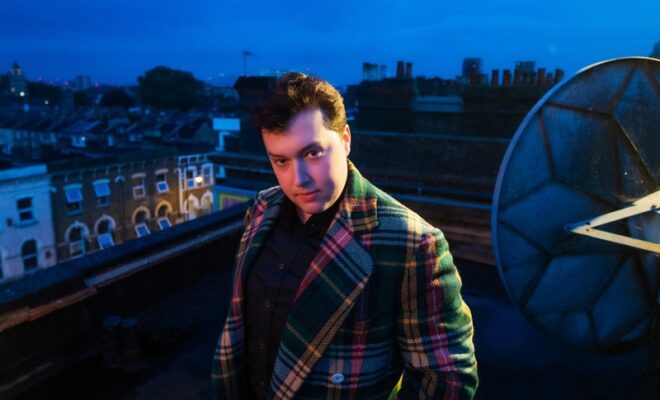 Carl Muphovi - Muphovi Ltd
Carl Muphovi - Muphovi Ltd
Interviews
RJ Gibb – Lose Control
By: Jamie Steinberg
Q) How would you describe your sound?
A) I’d say my sound is a constant evolution—a fusion of the familiar and the unexpected. I like to weave together emotional depth with various textures, pulling from classical music, rock, R&B, bluegrass, pop, EDM and many other genres as well. My goal is to create music that’s both raw and relatable, something that sticks with you and invites multiple listens. I also believe in the power of “hooks,” which I think have been somewhat forgotten in a lot of modern music. Ultimately, I want my music to resonate on a personal and emotional level, but also make you feel alive in the moment, letting you fully immerse yourself in the experience.
Q) Certainly, your iconic father Robin Gibb and his brothers played a major role in your childhood, but who are some of your other musical influences growing up?
A) Growing up, the influence of my father and uncles was huge, but I also explored a wide range of artists beyond that. From classical composers like Franz Schubert to rock legends like The Kinks and Buddy Holly, my musical tastes were always broad. I’ve also been inspired by icons like Elvis Presley, Motown, Nirvana, The Smiths, Red Hot Chili Peppers and David Bowie. Bowie’s ability to constantly reinvent himself really struck a chord with me. The Beatles were, of course, another significant influence—there’s something magical about their melodies and lyricism. I’ve also found inspiration in blues, doo-wop and jazz legends like B.B. King, Miles Davis, Louis Armstrong and The Chords, among too many others to name here, and in more contemporary acts like Daft Punk. Music, to me, is a bit like a tapestry, and I try to draw from every genre to create something truly unique.
Q) As someone who grew up around those in the music industry, were you encouraged or discouraged from becoming a musician?
A) There wasn’t really any pressure one way or the other. Music was just always around; it was the air I breathed growing up. My father, and indeed my family, never pushed me into the realm of music composition, but being surrounded by it I was naturally drawn to it. They were supportive, but they allowed me the freedom to find my own path, which I’m so very grateful for. I never felt like I had to follow in their footsteps, but music became an inevitable part of my journey.
Q) What piece of advice were you given by your father or his brothers that you really took to heart when becoming a musician?
A) One of the biggest pieces of advice I received from my father was to never give in. He always said that it wasn’t a matter of whether I could do something, but whether I was willing to, which would yield success. He also emphasized not overthinking things too much. Simplicity and symmetry are the keys to beauty, whether in music, a mathematical equation, a beautiful person or anything else in this world. As a family, we always adhere to the K.I.S.S. principle – “Keep It Simple, Stupid” – as you will often find that the most successful songs are those that preserve such simplicity and symmetrical principles. Often, less is more. Above all, they taught me to stay true to myself and to always strive for authenticity, even when it’s a risky decision. He knew well that people can sense when you’re being genuine in your music and that’s something I’ve always carried with me. By extension, this is what I would give as advice to everyone out there: what sounds great is great. There’s no such thing as right or wrong in musical composition – if it sounds profound and makes you really feel it within your bones, then you know full well it was worth every effort.
Q) Talk about the story behind your new song “Lose Control.”
A) “Lose Control” is about breaking free – whether that’s from self-doubt, expectations or just the noise of everyday life. It’s about those moments when you have to let go and live in the moment without overthinking everything. Musically, I wanted it to feel urgent and liberating, with beats that push you forward. The song is really about embracing the chaos and allowing yourself to surrender to the moment.
Q) What do you think it is about the song that fans connect to?
A) I think it’s the sense of freedom the song brings. Everyone has moments where they just want to break out of whatever’s holding them back – whether it’s stress, emotions or pressure from life. Fans have told me that the song makes them feel empowered, like they can let go and be themselves. That’s exactly the response I was hoping for, and it’s amazing to hear that it’s resonating with people.
Q) How does the video for the track play into the message behind it?
A) The video for “Lose Control” amplifies the song’s message visually. It’s about shedding your inhibitions and finding freedom, but there’s also a reflective aspect. The video shows that sometimes the battle is within ourselves and, once we overcome that, we can truly experience liberation. The dynamic movement and shifting perspectives reflect the dance between control and chaos, reinforcing the idea that sometimes we need to let go to find clarity.
Q) What is your songwriting process? Do you need music before you can create lyrics?
A) Usually, I would say that it is the song’s music I produce first, which then gives me the imagery in my mind and the feelings it conjures deep within me, so I can then put pen to paper and write its lyrics. But in practice, it can vary. Sometimes I’ll start with a melody or a chord progression, and the lyrics then follow naturally. Other times, I begin with a feeling or a line I wish to express and then build the music around that. With “Lose Control,” the feeling came first, and the music followed. I don’t have a rigid process. I let the song dictate where it wants to go. It’s more intuitive than formulaic for me.
Q) How much of a hand do you have in the production of your music?
A) I compose, orchestrate and write all of my own music and lyrics. I am very involved in the production process as well. For me, production is just an extension of songwriting. As far as the production and mixing processes are concerned, I have a hand in everything from the arrangement to the textures that bring the song to life. I work with some amazing producers and sound engineers and, although the song is “my baby,” so to speak, it’s also a collaborative effort. We all work together to make sure the final sound aligns with my vision.
Q) With “Lose Control” out now, is this a prelude to a full album or EP coming in the near future?
A) Yes, “Lose Control” is a taste of what’s to come. I’m working on more material and there will definitely be more releases down the line. I don’t want to give too much away just yet, but I’m excited about where things are heading musically. I’m exploring a lot of new sounds and ideas, and I think fans will enjoy what’s coming next. There will be some unreleased works I created with my father, some modern covers of his solo works and some Bee Gees hits, as well as a line of my own EDM tracks (which are usually radio-friendly “crossover” compatible tracks), along with some pop tracks and ballads.
Q) Who would you most like to collaborate with on a song?
A) There are so many artists I’d love to collaborate with. Paul McCartney, Daft Punk, Nile Rodgers and Pharrell Williams come to mind. I’d also love to work with contemporary artists like Bebe Rexha, Halsey, David Guetta, Taylor Swift, Billie Eilish, Olivia Rodrigo, Martin Garrix, Kygo, The Chainsmokers, Zedd, Tiesto and many others. Even some newer voices such as James Brown Jr., with whom I’m already in talks. I think we could create something truly special together.
Q) What artist/musician are you currently listening to and why do you dig them?
A) I’ve been listening to a lot of Kid Cudi and Dua Lipa. I love how they blend modern production with a sense of nostalgia, and there’s this cinematic quality to their music that really pulls you in. As aforementioned, David Guetta, Kygo, Martin Garrix, The Chainsmokers and others on the EDM and pop music scenes because all of the artists I’ve mentioned here are seemingly unafraid to take risks, both lyrically and sonically, which is something I always respect in an artist.
Q) What would you like to say to everyone who is a fan and supporter of you and your work?
A) I just want to say thank you from the bottom of my heart. Your support means everything to me. Whether you’ve been with me from the beginning or are just discovering my music now, I’m incredibly grateful for each and every one of you. There’s so much more to come, and I’m excited to share the journey with you!





You must be logged in to post a comment Login